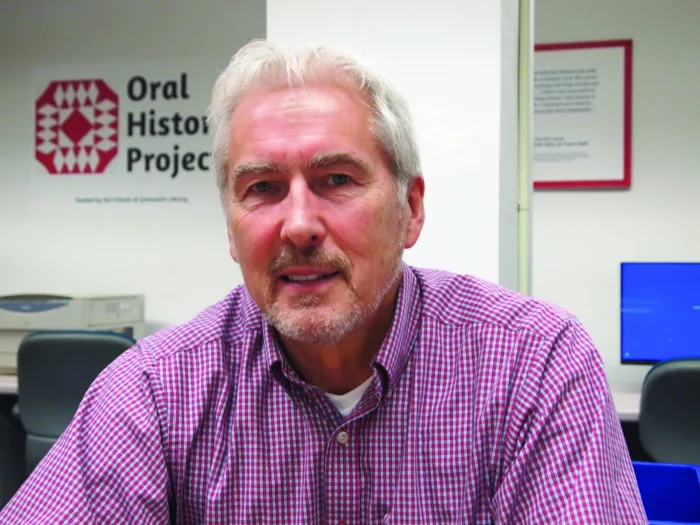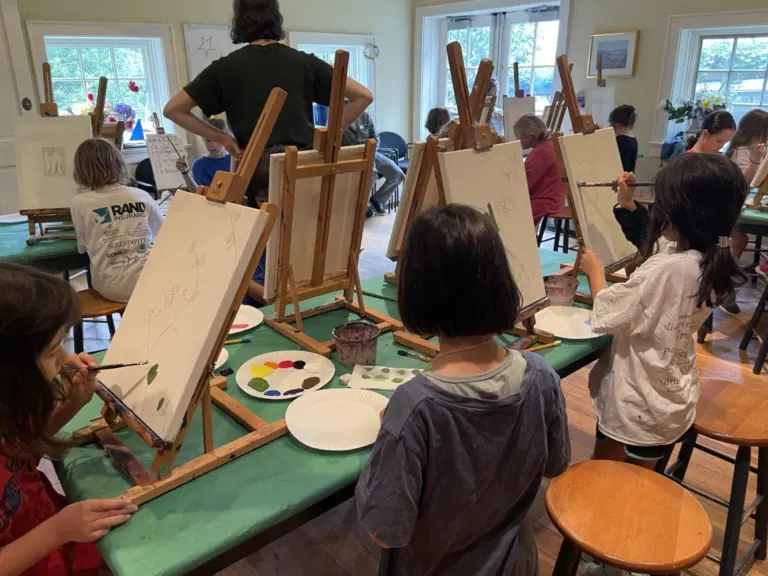
By Mary A. Jacobson
“I came here to become American. I felt like I was born American; it was just in a ‘wrong’ place.”
Andrzej Mazurek was born in Oslowo, Poland, in 1957. He charted the long road from this small town in Poland to Greenwich in his interview with Oral History Project volunteer Connie Gibb in 2017.
In Oslowo, Andrzej’s family had a few acres of land. “So we were basically farming there in addition to what my parents were able to work in the state-run enterprises… As a child, I didn’t really care much that the Communists were running the country… but the longer we lived there, I saw how difficult it was for common people to live under that system.” Life in a small town of 3,000 residents did provide some sense of security. “You knew everybody and people were friendly in that common misery; they were helping each other because it was difficult for many people to make ends meet.” Because Andrzej had relatives living in the States, “we were a few of the privileged families that had somebody in the West.” This window on the West fueled Andrzej’s ambitions to reach America.
Andrzej attended a technical high school and was trained as an engineer. He recognized that his future would be best in America. “I kind of had that understanding early on because there was no hope of things changing. Things were getting actually worse year after year.” His first attempt at obtaining a passport was denied by the Communists.
In 1978, he decided to move to Gdansk to work in the ports, where the Solidarity movement was active, although still underground at the time. Solidarity was the first independent trade union in a Warsaw Pact country. It eventually grew from a local movement to a national force. Led by Lech Walesa, the Solidarity movement is widely recognized as having played a central role in the end of communist rule in Poland by 1989. As the shipyard workers were regarded as “troublemakers,” the Communists “were actually offering passports . . . and forcing some people to leave the country, to release some of the pressure.” Once Andrzej obtained a job in the port, “I was able to get a passport relatively easily.”
Still, the road to the U.S. was not easy for Andrzej. Armed with an invitation to his cousin’s wedding in America, he went to the U.S. Embassy, only to be denied a visa. “They said a lot of people come in and then stay illegally. So, they requested a bond, a thirty-five hundred dollars bond that I will come back.” That amount of money was more than Andrzej could afford, “enough to buy five cars in Poland.” Fortunately for him, his aunt in America put up the bond.
As he left Poland, Andrzej’s grandmother, ninety-four at the time, said to him, “When you go there, you never come back.”
Ironically, Andrzej’s paternal grandmother knew firsthand what it meant to lose the opportunity to become an American. She and her husband were Polish immigrants to the U.S. in the early 1900s. However, after WWI ended in 1918, they returned to their homeland in Poland, which had re-emerged as an independent state after years of partitions. Unfortunately, Polish independence was short-lived when, in 1939, “Hitler put the claim that he wanted that part of Poland in the Third Reich.” In 1941, the SS came and “they started to pick people . . . and they took my grandfather too – and they mass-executed them.”
Andrzej’s maternal family suffered also as they were separated, sending his mother to “a makeshift camp in Torun,” where the children “were put into German farms as slave labor or in the munition factory sewing uniforms for soldiers.” Andrzej’s ninety-year-old mother cared for two orphaned toddlers for two years at the camp. “I think that gave her the strength, the will . . . the power and hope to take care of them.” At war’s end, most of his mother’s family survived. “Everybody then started to go back, to walk back to where they lived . . . probably like two hundred miles away.” From 1939 until Andrzej left Poland for the U.S. in 1978, his family had lived under the harsh rule of Nazism followed by Communism.
Fortunately for her, Andrzej’s aunt was liberated from a German camp at the conclusion of WWII by the Americans and was offered the opportunity to go to the U.S., which she readily accepted. This event eventually enabled Andrzej to follow her path some thirty years later.
Living with his aunt in Mamaroneck: “I had great exposure to someone who kind of showed me the ropes, what America is all about and how can you move ahead.” Andrzej’s tourist visa changed to a student visa as he enrolled in community college once here. Then, he married here and obtained a “status to potential Green Card recipient and at that point you could start legally working.” Without many English skills, Andrzej took jobs in “construction, painting, basically manual labor.” Within five years, he became an American citizen.
Eventually, Andrzej was employed as an electrician for Conrail. Over the thirty years that Andrzej worked for Conrail (and then Metro North), he obtained an associate degree in programming. “And by then, I love computers, I got to go to IT (Information Technology).” Promotions followed. “I was making very good progress within the career, the programmer, information consultant, systems analyst, manager,” eventually receiving a degree at Lehman College.
Andrzej retired and moved to Greenwich to help his mother, who had emigrated to the U.S. by then. Fully integrated into life in Greenwich, Andrzej described his involvement in the community, volunteering at Neighbor to Neighbor, Nathaniel Witherell, and Greenwich Hospital, among other activities.
In Andrzej’s words, “I came here to become American.… America was known by the pioneering spirit, by the individualism, and that’s what mainly drove me into this country.”
The interview “A Polish American’s Immigrant Experience” may be read in its entirety at the main library. It is also available for purchase by contacting the OHP office. The OHP is sponsored by the Friends of Greenwich Library. Visit the website at glohistory.org. Our narrator’s recollections are personal and have not been subjected to factual scrutiny. Mary Jacobson serves as blog editor.



